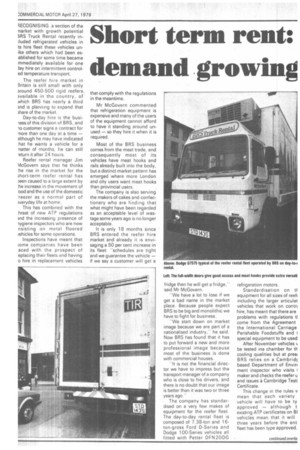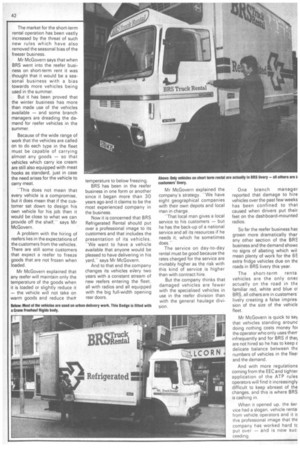Short term rent: demand growing
Page 43

Page 44

If you've noticed an error in this article please click here to report it so we can fix it.
3ECOGNISING a section of the narket with growth potential 3RS Truck Rental recently inluded refrigerated vehicles in ts hire fleet these vehicles unike others which had been esablished for some time became mmediately available for one Jay hire on intermittent controled temperature transport.
The reefer hire market in Britain is still small with only around 450-500 rigid reefers, available in the country, of ' ovhich BRS has nearly a third 3nd is planning to expand that ;hare of the market.
Day-to-day hire is the busiless of this division of BRS, and
io customer signs a contract for
nore than one day at a time — although he may have indicated :hat he wants a vehicle for a natter of months, he can still 'eturn it after 24 hours.
Reefer rental manager Jim VIcGovern says that he thinks he rise in the market for the ;hort-term reefer rental has )een caused to a large extent by
:he increase in the movement of .00d and the use of the domestic 'reezer as a normal part of averyday life at home.
This has combined with the hreat of new ATP regulations Ind the increasing presence of wgiene inspectors who are now nsisting on metal floored (elides for some operations.
Inspections have meant that some companies have been aced with the prospect of 'eplacing their fleets and having o hire in replacement vehicles that comply with the regulations in the meantime.
Mr McGovern commented that refrigeration equipment is expensive and many of the users of the equipment cannot afford to have it standing around unused — so they hire it when it is required.
Most of the BRS business comes from the meat trade, and consequently most of its vehicles have meat hooks and rails already built into the body, but a distinct market pattern has emerged where more London and city users want meat hooks than provincial users.
The company is also serving the makers of cakes and confectionery who are finding that what might have been regarded as an acceptable level of wastage some years ago is no longer acceptable.
It is only 18 months since BRS entered the reefer hire market and already it is envisaging a 50 per cent increase in its fleet: "schedules are tight and we guarantee the vehicle — if we say a customer will get a fridge then he will get a fridge," said Mr McGovern.
"We have a lot to lose if we get a bad name in the market place. Because people expect BRS to be big and monolithic we have to fight for business.
"We start down on market image because we are part of a nationalised industry," he said. Now BRS has found that it has to put forward a new and more professional image because most of the business is done with commercial houses.
It is net the financial director we have to impress but the transport manager of a company who is close to his drivers, and there is no doubt that our image is better than it was two or three years ago."
The company has standardised on a very few makes of equipment for the reefer fleet. The day-to-day rental fleet is composed of 7.38-ton and 16ton-gross Ford 0-Series and Dodge 100-Series vehicles all fitted with Petter DFN 20DG refrigeration motors.
Standardisation on if equipment for all sizes of reefi including the larger articulat vehicles that work on contri hire, has meant that there are problems with regulations tl come from the Agreement the International Carriage Perishable Foodstuffs and i special equipment to be used After November vehicles% be tested ma chamber for th cooling qualities but at presi BRS relies on a Cambrid based Department of Envin ment inspector who visits I maker and checks the reefer u and issues a Cambridge Testi Certificate.
This change in the rules v mean that each variety vehicle will have to be ty approved — although t existing ATP certificates on 131 vehicles mean that it will three years before the ent fleet has been type approved. The market for the short-term rental operation has been vastly increased by the threat of such new rules which have also removed the seasonal bias of the freezer business, Mr McGovern says that when BRS went into the reefer business on short-term rent it was thought that it would be a seasonal business with a bias towards more vehicles being used in the summer.
But it has been proved that the winter business has more than made use of the vehicles available — and some branch managers are dreading the demand for reefer vehicles in the summer.
Because of the wide range of work that the vehicles are called on to do each type in the fleet must be capable of carrying almost any goods — so that vehicles which carry ice cream are still also equipped with meat hooks as standard, just in case the need arises for the vehicle to carry meat, "This does not mean that every vehicle is a compromise, but it does mean that if the customer sat down to design his own vehicle for his job then it would be close to what we can provide off the shelf," says Mr McGovern.
A problem with the hiring of reefers lies in the expectations of the customers from the vehicles. There are still some customers that expect a reefer to freeze goods that are not frozen when loaded.
Mr McGovern explained that any reefer will maintain only the temperature of the goods when it is loaded or slightly reduce it — the vehicle will not take on warm goods and reduce their temperature to below freezing.
BRS has been in the reefer business in one form or another since it began more than 30 years ago and it claims to be the most experienced company in the business.
Now it is concerned that BRS Refrigerated Rental should put over a professional image to its customers and that includes the presentation of its vehicles. "We want to have a vehicle available that anyone would be pleased to have delivering in his yard," says Mr McGovern.
And to that end the company changes its vehicles every two years with a constant stream of new reefers entering the fleet, all with radios and all equipped with the big full-width opening rear doors. Mr McGovern explained the company's strategy. "We have eight geographical companies with their own depots and local man in charge.
"That local man gives a local service to his customers — but he has the back-up of a national service and all its resources if he needs it, which he sometimes does."' The service on day-to-day rental must be good because the rates charged for the service are invitably higher as the risk with this kind of service is higher than with contract hire.
But the company thinks that damaged vehicles are fewer with the specialised vehicles in use in the reefer division than with the general haulage division. One branch manager reported that damage to hire vehicles over the past few weeks has been confined to that caused when drivers put their feet on the dashboard-mounted radios.
So far the reefer business hat grown more dramatically thar any other section of the BRS business and the demand showE no signs of abating which wit mean plenty of work for the 6E extra fridge vehicles due on the roads in BRS livery this year.
The short-term renta vehicles are the only onet actually on the road in thE familiar red, white and blue o' BRS, all others are in customers. livery creating a false impres. sion of the size of the vehicle fleet.
Mr McGovern is quick to say that vehicles standing arounc doing nothing costs money foi the operator who only uses therr infrequently and for BRS if the are not hired so he has to keep delicate balance between thE numbers of vehicles in the flew and the demand.
And with more regulations coming from the EEC and tighter application of the ATP rules operators will find it increasingly difficult to keep abreast of the changes, and this is where BRS is cashing in.
When it opened up, the service had a slogan, vehicle renta from vehicle, operators and it it this professional image that thE company has worked hard tc put over -and is now suc ceeding.
















































































































































